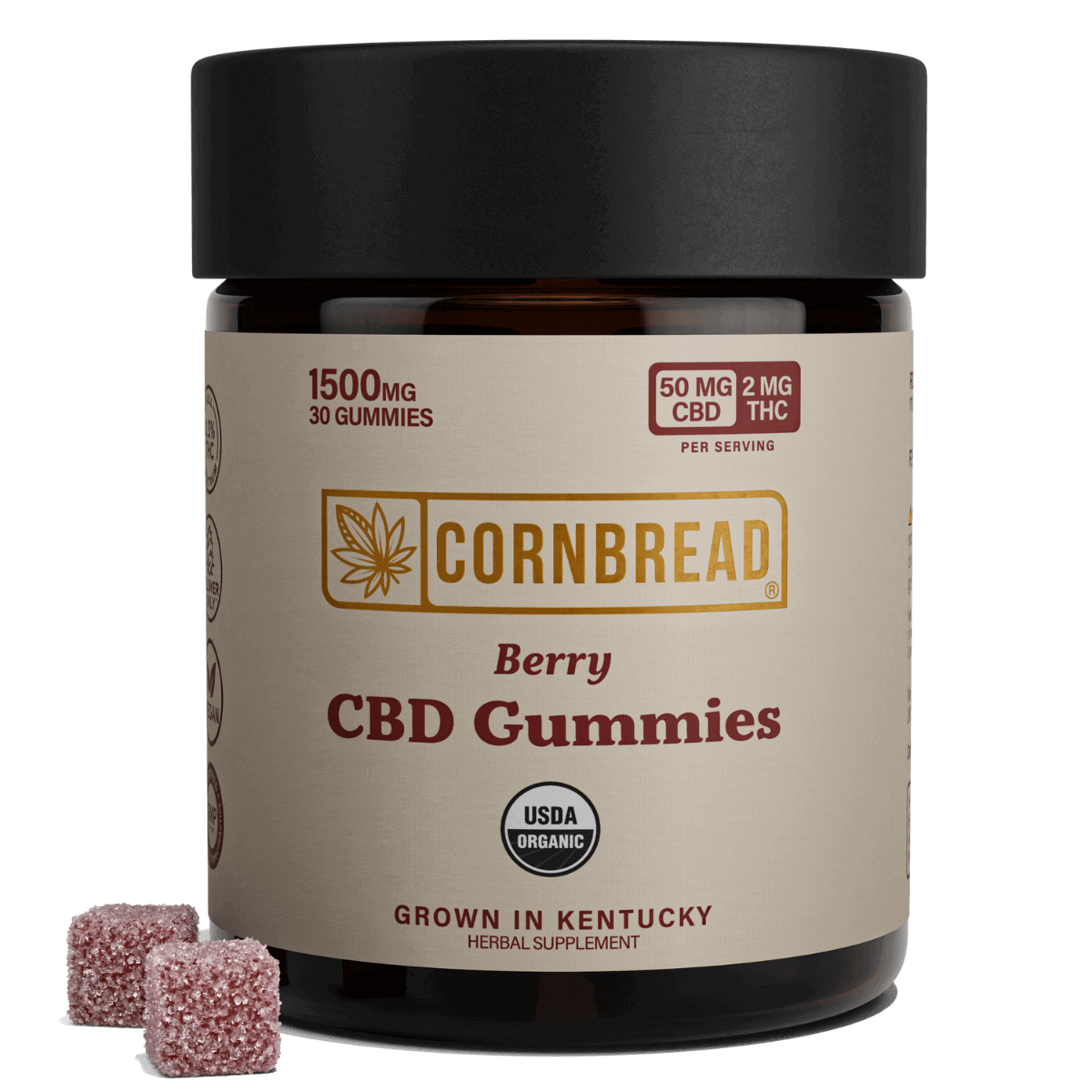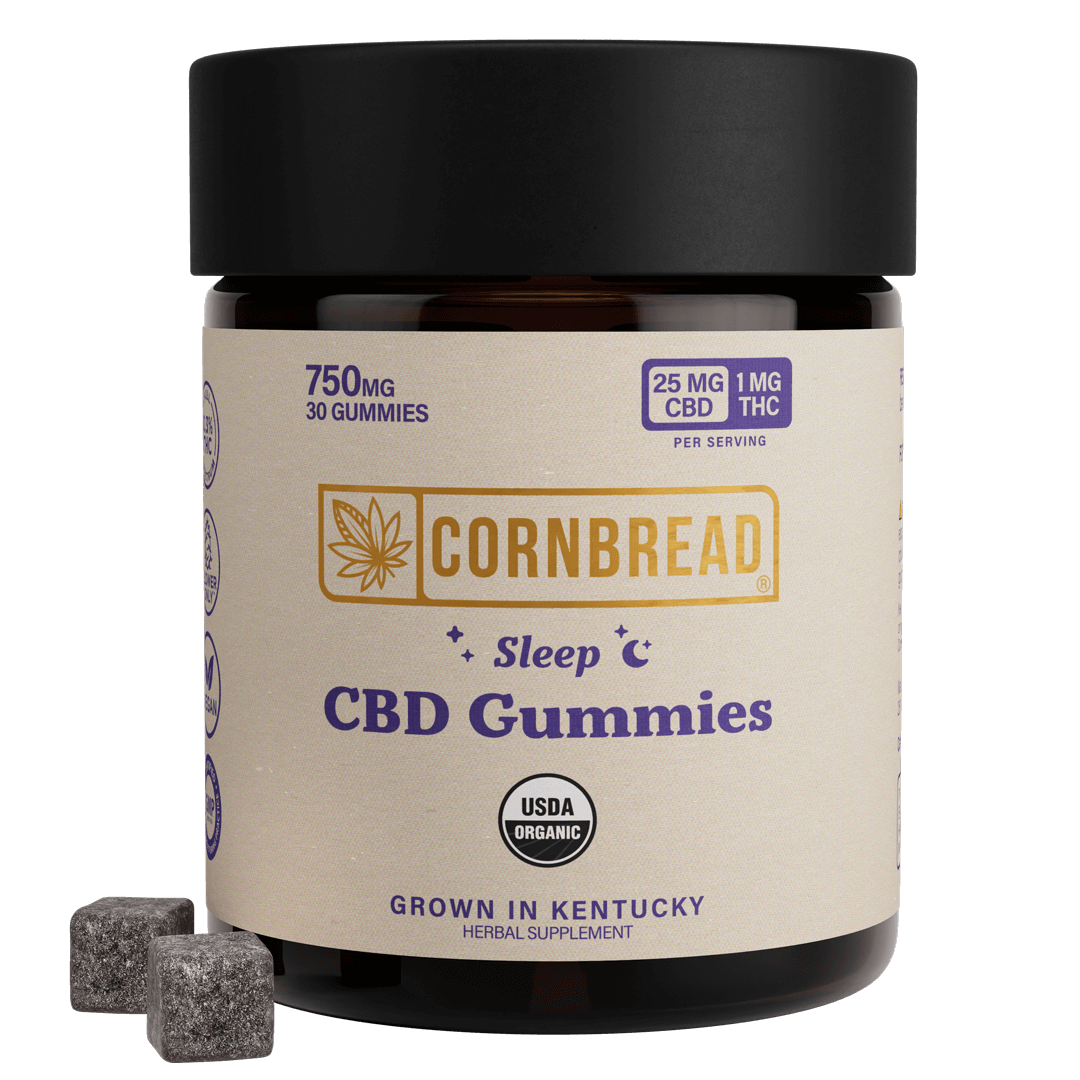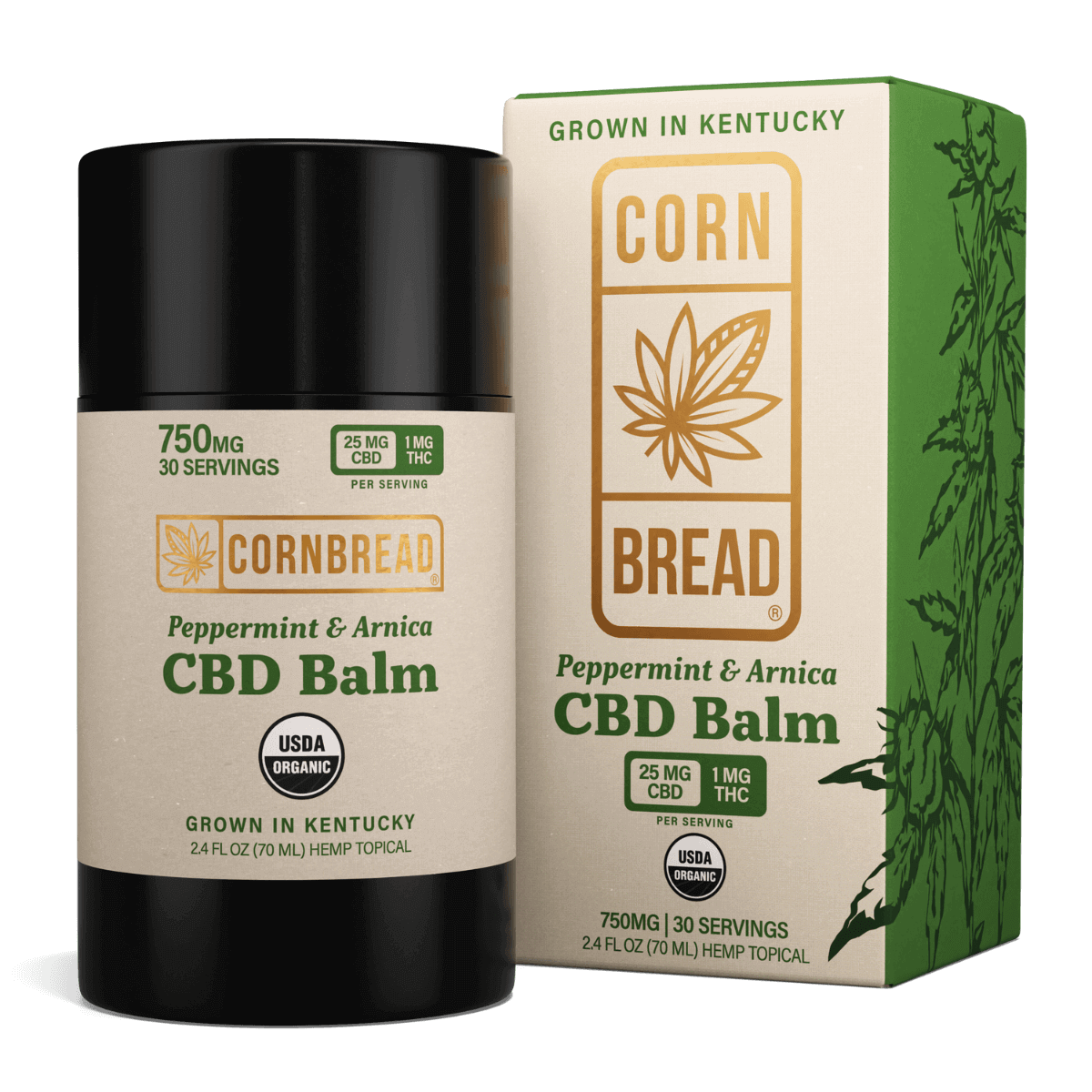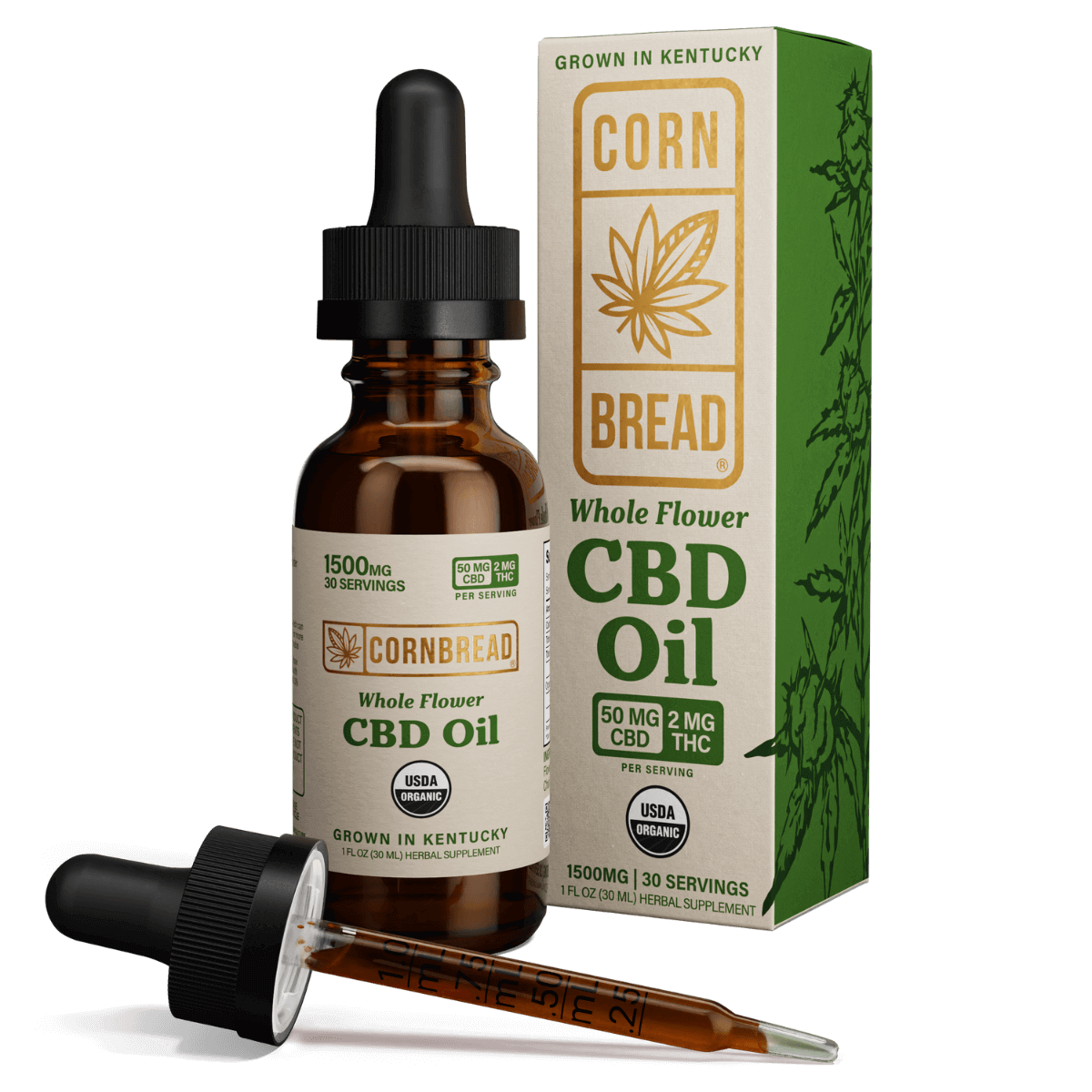Table of Contents
- Introduction
- First Things First: A Look at the Endocannabinoid System (ECS)
- CBD vs. THC
- CBD, THC, and Appetite
- So, Does CBD Make You Hungry?
- A Tale of Two Studies: Does CBD Have an Effect on Appetite?
- CBD's Possible Effects on Fat Cells and Brown Fat
- Does Full Spectrum CBD Make You Hungry?
- CBD and Appetite Stimulation
- CBD Gummies for Appetite
- CBD and Weight Loss: Can CBD Oil Help You Lose Weight?
- The Takeaway: Does CBD Increase Appetite?
- Full Spectrum CBD Oil from Cornbread Hemp
Introduction
The rise in popularity in the health and wellness space of CBD (cannabidiol) has captured the curiosity of consumers. While CBD — a supplement derived from cannabis plants — is widely known for its potential to support sleep, reduce aches and pains, and improve mood, the supplement's impact on appetite and weight management is a subject of growing interest.
Especially given the fact that CBD originates from the same plant as THC (tetrahydrocannabinol), which is known for producing a “high” as well as an increased appetite often known as “the munchies” — it’s natural for people to wonder if CBD has a similar effect on appetite.
In this article, we'll take a look at the science behind CBD's potential influence on appetite, the difference between CBD and THC, how these compounds interact with the body, and more.
First Things First: A Look at the Endocannabinoid System (ECS)
So, does CBD make you hungry? To answer that question, the endocannabinoid system (ECS for short) is a good place to start.
The ECS — a network of receptors, endocannabinoids (naturally occurring compounds produced by the body), and enzymes — acts as a regulatory system in the human body. As such, it's responsible for maintaining balance in a long list of physiological processes, including but not limited to, pain perception, mood, sleep, immune responses, inflammation, and — you guessed it — appetite.1
Whenever the body's internal balance is disrupted in some way, the ECS helps to restore equilibrium. It does this by signaling for the production of endocannabinoids to bind with receptors and influence the appropriate physiological processes. There are two main types of receptors within the ECS:
-
CB1 receptors are mainly found in the brain and central nervous system. They're involved in regulating mood, appetite, pain perception, and coordination.
-
CB2 receptors are mostly located in the peripheral tissues and immune cells. They play a role in immune response, inflammation, and other immune functions.
It’s interesting to note that cannabinoids derived from the cannabis plant (such as CBD and THC) bear a strong resemblance to the endocannabinoids found naturally within the ECS. For this reason, they’re also able to interact with the endocannabinoid system and influence the body’s many processes.
CBD vs. THC
Even though they both come from the same plant, CBD and THC work very differently in our bodies.
THC is known for its psychoactive, or mind-altering, effects. It produces a "high" feeling by latching onto CB1 receptors in the ECS. This activates the release of dopamine, a neurotransmitter associated with pleasure and reward.
Unlike THC, CBD doesn't have any psychoactive side effects. It interacts with the ECS mainly by indirectly influencing CB2 receptors. In this way, CBD inhibits the enzymes that break down cannabinoids and endocannabinoids. This enables ECS messengers to stick around for a longer period of time, which helps maximize their potential benefits.
CBD, THC, and Appetite
What do these two compounds have to do with our appetites? THC's interaction with CB1 receptors (those are the ones that influence dopamine response and appetite) is what leads to the "munchies" — that notoriously overwhelming craving for food, especially snacks.
CBD, unlike THC, doesn't interact with CB1 receptors. This means CBD doesn't cause the same euphoric “high” or trigger the munchies.
So, Does CBD Make You Hungry?
Now, you might wonder if CBD can still make you hungry. CBD doesn't give you the munchies. However, it might still play a role in regulating hunger through its interaction with the ECS. So you could say its impact on appetite is more nuanced.
Additionally, as long as you choose a high-quality supplement, CBD can support your sleep and mood and provide relief from occasional aches and pains. All of this can have an effect on appetite as well.
Just be aware that CBD's impact on appetite isn't one-size-fits-all. In fact, it can vary quite a bit from person to person. To show you how complex this question is, let’s take a look at two studies that set out to answer the question, “Does CBD Make You Hungry?”
A Tale of Two Studies: Does CBD Have an Effect on Appetite?
Let's see what science has to say about whether or not CBD makes you hungry.
CBD Can Make Some People More Hungry …
A survey from 20182 was conducted on 2,049 CBD users and found that increased appetite was reported as a side effect by 153 participants. While that’s only 6.35 percent, it’s still worth noting.
… And CBD Can Make Other People Less Hungry
A 2022 review of 11 clinical trials3 found the opposite. The majority of the trials reviewed found that CBD reduced appetite, some of them reported no significant changes, and only one observed an appetite increase. However, researchers acknowledged a risk of bias associated with most of the review's studies.
The Takeaway
What can we glean here? We need more research to truly understand CBD’s effect on hunger. But if these two studies above tell us anything, it’s that there can be significant variation in CBD's effects from one individual to another.
The ECS strives for balance, and achieving this balance is a highly individualized process. Some people may observe an increase in appetite when using CBD, while others may experience a decrease. And there are also those who may not report any changes at all.
CBD's Possible Effects on Fat Cells and Brown Fat
Some research4 has delved into CBD's impact on fat cells, particularly brown fat. Brown fat is known for breaking down blood sugar and fat molecules to generate heat, contributing to the regulation of body temperature and facilitating fat loss. Some data suggests CBD plays a potential role in converting energy-storing white fat into metabolically active brown fat.
So, while CBD doesn't directly influence hunger, this study hints at an intriguing connection between cannabidiol and brown fat. Yet more extensive research is needed to determine if CBD may indeed help lower body weight.
Does Full Spectrum CBD Make You Hungry?
The composition and quality of CBD products also need to be accounted for because they can influence the impact of CBD on appetite as well as on all of the physiological processes of the body. This brings us to our next point …
There are three types of CBD oil available to consumers:
Full Spectrum CBD
Full-spectrum CBD oil contains various compounds from the cannabis plant (specifically from hemp, which is a variety of cannabis sativa). The primary compound is CBD, but full spectrum oils will also include trace amounts of THC (no more than 0.3%) and other cannabinoids, as well as terpenes and flavonoids (compounds that give plants their color, flavor, and smell).
Full spectrum CBD oil is thought to be the most effective form of CBD because it produces the “entourage effect.” This term describes the observed heightened therapeutic benefits brought on by taking various cannabinoids together, instead of on their own.
Broad Spectrum CBD
Broad spectrum CBD oil is similar to full spectrum, as it contains many of the same compounds. The big difference is that broad spectrum CBD oil doesn’t include THC in any measurable amount. This somewhat limited spectrum is the preferred choice for those concerned about THC content.
CBD Isolate
CBD isolate is pure CBD in a crystalline powder. It can be used to make CBD oil that contains only CBD and no other cannabis compounds. CBD isolate is chosen when individuals desire the benefits of CBD without the influence of other cannabis compounds.
Out of these three types of CBD oil, full spectrum CBD oil is the only one that contains any measurable amounts of THC (though, no more than 0.3%). However, full-spectrum CBD doesn't have enough THC to make you feel “high” and it won’t trigger strong food cravings or “the munchies.” It’s also the type of CBD oil offering the most therapeutic promise because of the entourage effect.
CBD and Appetite Stimulation
Many people wonder: Can CBD help with appetite? As we’ve explained, CBD doesn't stimulate the appetite like THC. Instead, it is frequently employed for relieving aches and pains, stress reduction, mood enhancement, and sleep improvement — issues that can indirectly impact one's appetite.
Research has established a link between mood or emotional states and dietary preferences5 as well as various eating disorders. If your reduced appetite is linked to issues such as these, then there could be an indirect impact of CBD oil on your eating habits. In that sense, CBD can potentially contribute to an overall sense of well-being, thereby fostering a healthier relationship with food.
It's a misconception that CBD is a direct appetite stimulant. Instead, this supplement provides a general boost to one's well-being. In this way, it could potentially affect appetite by supporting certain health issues, but any effects would be indirect.
CBD Gummies for Appetite

What about other types of CBD? Can CBD gummies help with appetite? When derived from hemp, full spectrum CBD gummies contain a small amount of THC (0.3 percent or less). As mentioned above, like full spectrum CBD oil, gummies aren’t typically associated with appetite stimulation. This aligns with the earlier explanation that CBD doesn't usually induce hunger, but rather influences other physiological functions that may indirectly impact appetite.
CBD and Weight Loss: Can CBD Oil Help You Lose Weight?
If you’re curious about how CBD affects your appetite, there’s a good chance you’d like to know if CBD can aid weight loss. Some CBD companies like to boast that their CBD products can decrease appetite and help with losing weight, but how reliable are these claims?
There’s no hard evidence that CBD can help with weight loss. What we do know is that the effects of CBD are unique to each person. As mentioned above, CBD may influence appetite regulation thanks to its interaction with the ECS. But while some may notice a stronger appetite, others may find their appetite is curbed, and still others might not notice a thing.
Either way, the supplement doesn’t directly cause weight loss. CBD may indirectly influence weight by easing occasional aches and pains, improving sleep, and supporting your mood and stress levels — all of which can play into your appetite.
Can CBD Cause Weight Gain?
Now, can CBD make you gain weight? There's limited research on whether CBD may cause a person to gain weight and individual experiences will vary. Some may find that CBD indirectly contributes to factors associated with weight gain, such as improved appetite and sleep, but others won't.
The Takeaway: Does CBD Increase Appetite?
While CBD doesn’t have a direct effect on hunger, it can influence your overall health, which may have an impact on appetite. Still, the effects of CBD vary by the individual and depend on the quality of CBD oil taken.
Rather than looking for the best CBD to increase appetite, you should look for the best CBD to balance your ECS. And when it comes to that, full spectrum CBD oil is the best place to start.

Full Spectrum CBD Oil from Cornbread Hemp
At Cornbread Hemp, we understand the importance of high-quality CBD oil that you can count on. All Cornbread Hemp products are full spectrum, made from Flower-Only™ extract, and are USDA certified organic through each step of the process. We use third-party lab testing and provide the results on our website so our customers know exactly what's in our cannabinoid products. Shop our full-spectrum CBD products now.










 Log in
Log in






















